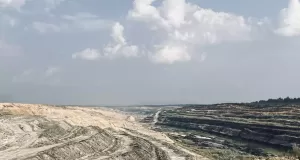In order to “compensate” the government of the United Kingdom for the expense it incurred in forcing a mass deportation of the Indigenous people of the Chagos Archipelago, the United States gave the UK a discount on the purchase of American nuclear weapons.
This was among one of many horrifying details that emerged from a report issued by Human Rights Watch earlier this year detailing how, “About 60 years ago, the United Kingdom government secretly planned, with the United States, to force an entire Indigenous people, the Chagossians” into exile.
The purpose of the deportation was a secret deal struck between the UK and the US to create a US military base on Diego Garcia, the largest of the Chagos islands. The Chagos Archipelago consists of a series of islands and atolls in the Indian Ocean. But first, the inhabitants of those islands had to be removed.
To carry out what was effectively a racially-motivated deportation, the UK split the Chagos Archipelago from Mauritius, a UK colony, created a new colony, the British Indian Ocean Territory, and then lied to the United Nations that there were no permanent residents on the Chagos Islands.
“The reality was that a community had lived on Chagos for centuries,” said the Human Rights Watch report, entitled “That’s When the Nightmare Started”: UK and US Forced Displacement of the Chagossians and Ongoing Colonial Crime.
The Chagossians are predominately descendants of people enslaved by the British and French, forced from their homelands in Africa and Madagascar and brought to the then uninhabited Chagos Islands to work coconut plantations. In time, they created their own cultural identity, becoming a distinct peoples.
But between 1965 and 1973, the entire population of the Chagos Archipelago was deported to Mauritius and the Seychelles where, according to the report, they lived in squalid conditions of abject poverty, with all promises of housing and jobs broken. There was nothing there for them and they were offered neither choice nor compensation.
Meanwhile, the UK received a $14 million discount from the US for its purchase of American Polaris nuclear-armed submarine-launched ballistic missiles.
This was among the details revealed as more documents come to light exposing what the HRW report described as “not only the plans, but the blatant racism of UK officials toward the Chagossians that highlights the discriminatory nature of their treatment.”
In a document dated 30 December 1966, the US Ambassador to London at the time, David K. E. Bruce, wrote to the British secretary of state for foreign affairs, George Brown:
“Since the United Kingdom is assuming the costs of the administrative detachment of the Indian Ocean islands and of the acquisition of the lands thereon, the United States will forego the R&D surcharge to the extent of $14 million, or one half of the foregoing Indian Ocean islands costs incurred by the United Kingdom, whichever is the less.”
Thus, the Indigenous people of Chagos were bartered away for their homeland from which, still today, the United States stages its nuclear submarine force.
The Chagossians, meanwhile, have fought for years not only for reparation, but for the right to return home. This has been denied to them by both the US and UK governments, even as the US continues to benefit from its occupation of the militarily strategic Diego Garcia base, a place so secret that only military personnel are allowed there; their families cannot accompany them.
Mauritius has also asked for the return of the islands, a discussion the UK government officially opened last November but one HRW views with skepticism.
“There is, currently, little transparency about the negotiations and no clear declaration that the Chagossian people will be effectively and meaningfully consulted in this decision that will affect them profoundly, and that their right to reparations, including the right to return, will be fully and effectively centered in the negotiations and guaranteed in the outcome,” said the report’s summary.
The story of the Chagossians of course has an eerily familiar ring. During the years of atomic testing in the Pacific, the United States forced the removal of Marshall Islanders in order to bomb their atolls into smithereens. Then they seized another of their islands — Enewetok — from which to stage the futile and largely ineffective Strategic Defense Initiative, also known as Star Wars, in order to conduct missile interception tests.
Today, the island of Ebeye, where most Marshall Islanders were moved to, consists of crowded slums with inadequate services. The conditions were described by photographer, Vlad Sokhin, in an essay we published on Beyond Nuclear International in November 2018:
“The tiny island of Ebeye in Kwajalein Atoll, Marshall Islands, has a total area of 0.36 square kilometres and is home to over 15,000 people, most of whom were moved there from nearby islands because of a US Army missile range-testing program that was launched in the late 1940s. Overcrowding, poverty, outbreaks of infectious diseases and a high level of unemployment has led some to refer to Ebeye as the ‘ghetto of the Pacific’”
The racist abuse the Marshall Islanders suffered at the time of the atomic tests and subsequently, when they were treated like nuclear guinea-pigs, and described by one US officials as “more like us than mice”, was unforgettably told in the Adam Jonas Horowitz documentary, Nuclear Savage.
The Marshall Islanders have received some minimal compensation from the US government, including the right to live in the US. There is a deep irony here, given it is the appalling conditions the US itself forced on Marshall Islanders that may prompt them to leave their once beloved homeland. (Never mind that over-consumptive carbon emitters like the US, one of the chief perpetrators of the current climate crisis, are now inflicting a second agony on Marshall Islanders as they watch sea-level rise slowly consume them.)
Likewise, some Chagossians who were forcibly moved to Mauritius received a tiny amount of compensation. Those exiled to the Seychelles did not. In 2003, the British government offered citizenship to displaced Chagossians, but with restrictions, including the need to have been born on the islands. This meant that younger generations within some families could legally emigrate to the UK, whereas their parents and grandparents could not. Once again, families were split apart.
The right to return remains the central fight for the exiled Chagossians. After winning a court case in the UK that allowed Chagossians to return to selected islands, but without any financial report, the UK later reversed the policy. Today, there is no right of return.
This colonial racism is repeated across the nuclear spectrum, most notably in the realm of uranium mining where Indigenous people are exploited as the workforce under slave labor conditions, whether in Australia, Africa or North America, then effectively abandoned to the toxic legacy and lethal health effects.
If the Chagossians eventually receive monetary compensation, it won’t heal the double wounds inflicted on them — torn first from their African birthplace and then from an island paradise to which they had adapted and now call home.
And the story of the Chagossians is just one chapter in a long list of colonial human rights abuses, too many of which seem to have a nuclear component as well.
(Linda Pentz Gunter is the international specialist at Beyond Nuclear and writes for and curates Beyond Nuclear International. She is a frequent contributor to Dennis Bernstein’s Flashpoints on Pacifica, has appeared a few times on Rising Up and writes for Truthout and the UK socialist daily newspaper, The Morning Star, among other media outlets. Courtesy: Beyond Nuclear International (BNI), an American news portal curated by Linda Pentz Gunter that seeks to tell the stories of the anti-nuclear struggle in a different way, with a focus on the humanitarian impacts of nuclear power and nuclear weapons.)




